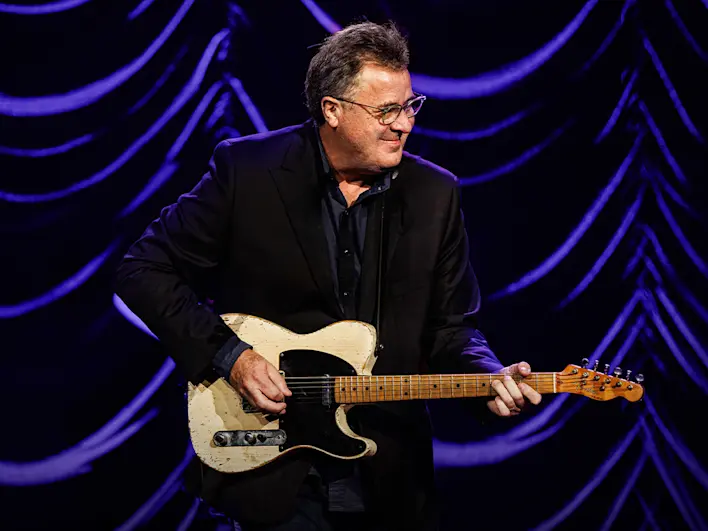Vince Gill, one of country music’s most celebrated artists, brought his deep-rooted musical and spiritual influences to center stage during a recent performance at the Grand Ole Opry. Known for his soulful voice, instrumental talent, and long-standing presence in the music industry, Gill continues to resonate with audiences across generations.

A Storied Career in Country Music
Born in 1957 in Norman, Oklahoma, Vince Gill began his professional music career in the 1970s, gaining recognition as a member of the country-rock band Pure Prairie League. He later established a successful solo career in the 1980s and 1990s, releasing a string of critically acclaimed albums. Over the years, he has earned 22 Grammy Awards—more than any other male country artist—and has sold over 26 million albums globally, according to the Recording Academy and RIAA.
Gill’s music spans a variety of genres, including traditional country, bluegrass, and gospel. His versatility and emotional depth have made him a mainstay in American music. In recognition of his enduring impact on the genre, he was inducted into the Country Music Hall of Fame in 2007.

A Reverent Moment at the Grand Ole Opry
Vince Gill was recently featured in a performance at the Grand Ole Opry, a prestigious weekly country music show that has been a cornerstone of American country music since 1925. The Grand Ole Opry, based in Nashville, Tennessee, continues to host some of the most respected and influential artists in the genre.
During this appearance, Gill performed alongside Little Big Town, a contemporary country music group known for their tight harmonies and chart-topping singles. The collaboration underscored Gill’s relevance and continued demand within the modern country music landscape.

The Choice to Perform “Why Me Lord”
One of the highlights of Gill’s performance was his rendition of “Why Me Lord,” a gospel song originally written and recorded by Kris Kristofferson in 1972. The song, which expresses themes of gratitude and redemption, has been covered by numerous notable artists, including Elvis Presley and Johnny Cash.
Gill’s interpretation of the song was met with overwhelming audience appreciation. The performance was powerful and sincere, showcasing his vocal clarity and heartfelt connection to the material. According to publicly shared audience reactions and coverage from music outlets such as Billboard and The Tennessean, the rendition received a standing ovation, a testament to the emotional resonance of the moment.

Faith and Music: A Longstanding Connection
Gill has often spoken publicly about the importance of faith in his life and music. His gospel-influenced songs are not uncommon in his repertoire. Albums like These Days and Okie feature tracks that touch on themes of spirituality, forgiveness, and personal reflection. His ability to intertwine faith-based content with mainstream country music has contributed to his widespread appeal.
While some venues and events may set guidelines about performance content depending on context and audience, artists like Gill continue to find meaningful ways to express their artistic and spiritual identity within those frameworks.

A Performance That Resonated
The audience’s positive reception of “Why Me Lord” illustrates the power of music to transcend boundaries. Rather than focusing on the specifics of genre or lyrical content, listeners responded to the sincerity and talent Gill brought to the stage. His legacy as a performer rests not only on technical skill but also on his ability to connect deeply with listeners through authentic storytelling.
Gill’s performance did not include any reported breaches of policy or disruptions, and the moment has since been celebrated by fans and media as an example of his enduring artistry.

Legacy of a Country Music Icon
Vince Gill’s contributions to music go far beyond this single performance. In addition to his solo career, he has collaborated with numerous artists, from Dolly Parton and Reba McEntire to the Eagles, where he joined as a touring member in 2017 following the passing of Glenn Frey.
Beyond the stage, Gill is known for his philanthropic efforts and his work supporting music education. He has contributed to organizations such as the Country Music Foundation and the Nashville Symphony, promoting access to music for future generations.
His continued appearances at venues like the Grand Ole Opry underscore his role not just as a performer, but as a cultural figure who has shaped—and continues to influence—the genre of country music.

Conclusion
Vince Gill’s Grand Ole Opry performance offered more than just musical entertainment; it served as a reminder of his unique ability to blend personal conviction with broad audience appeal. Grounded in decades of excellence and unwavering dedication to his craft, Gill remains a defining voice in American music. His choice to perform a beloved gospel classic in a historic venue reflects both his respect for tradition and his commitment to sharing meaningful, heartfelt music with the world.
Sources:
Recording Academy
Country Music Hall of Fame
Billboard
RIAA Gold & Platinum Database
The Tennessean – Local Coverage of Grand Ole Opry Events
